2022年中考英语语法专题-第05讲介词及介词短语
文档属性
| 名称 | 2022年中考英语语法专题-第05讲介词及介词短语 |
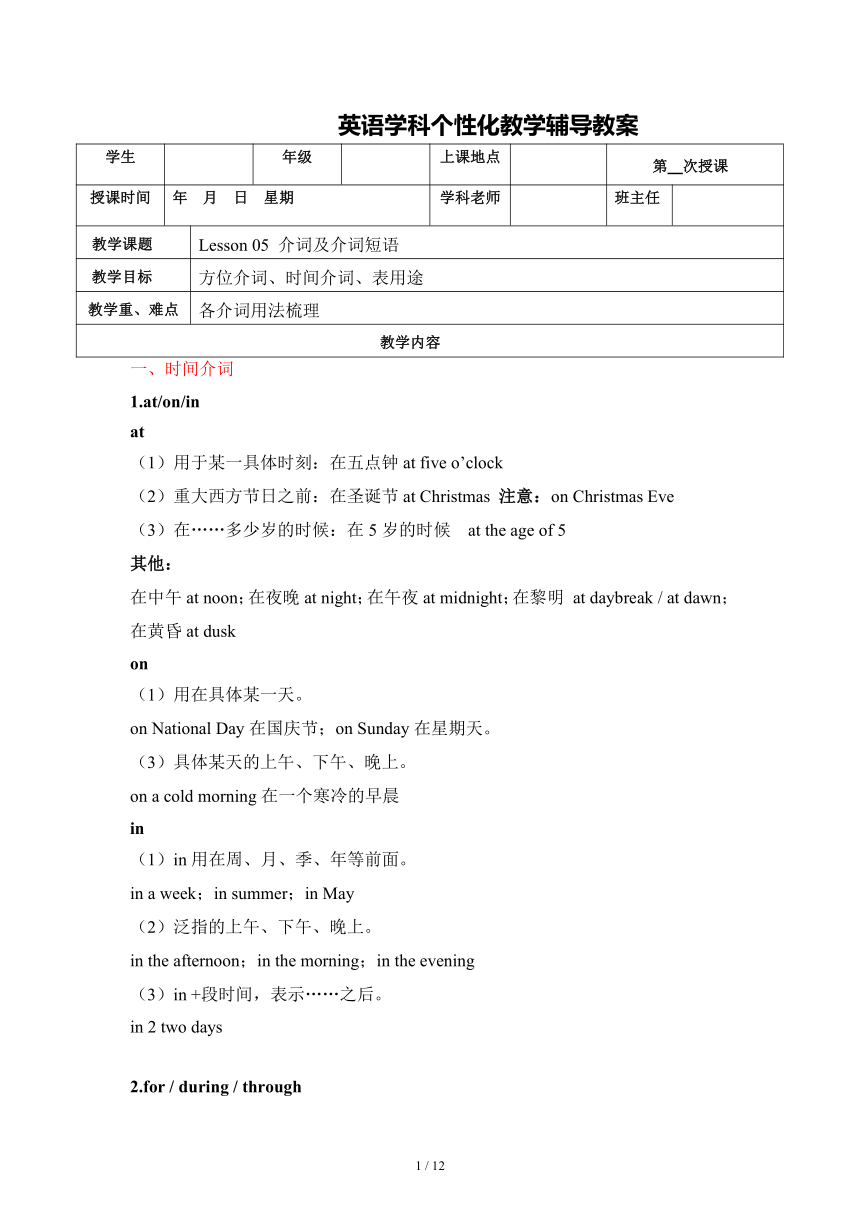
|
|
| 格式 | docx | ||
| 文件大小 | 41.7KB | ||
| 资源类型 | 教案 | ||
| 版本资源 | 通用版 | ||
| 科目 | 英语 | ||
| 更新时间 | 2022-01-19 19:11:07 | ||
图片预览

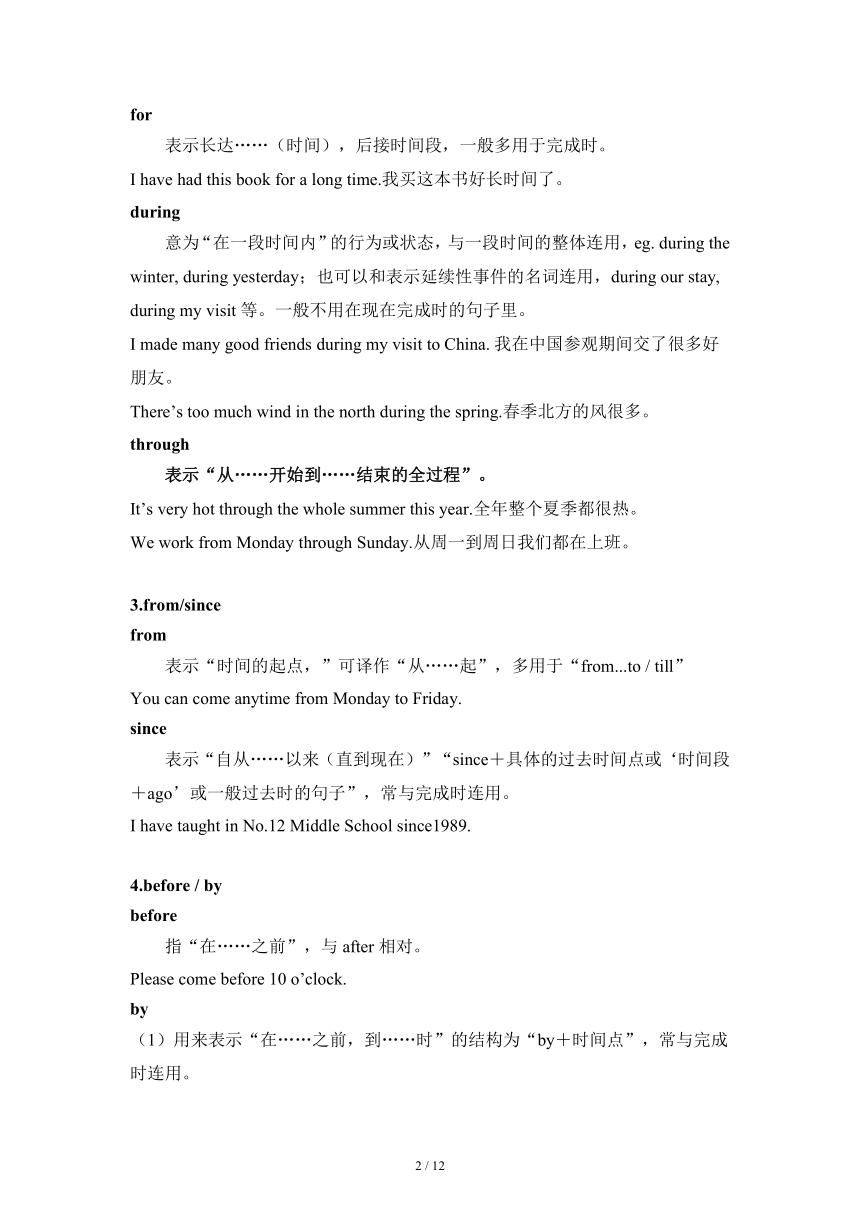
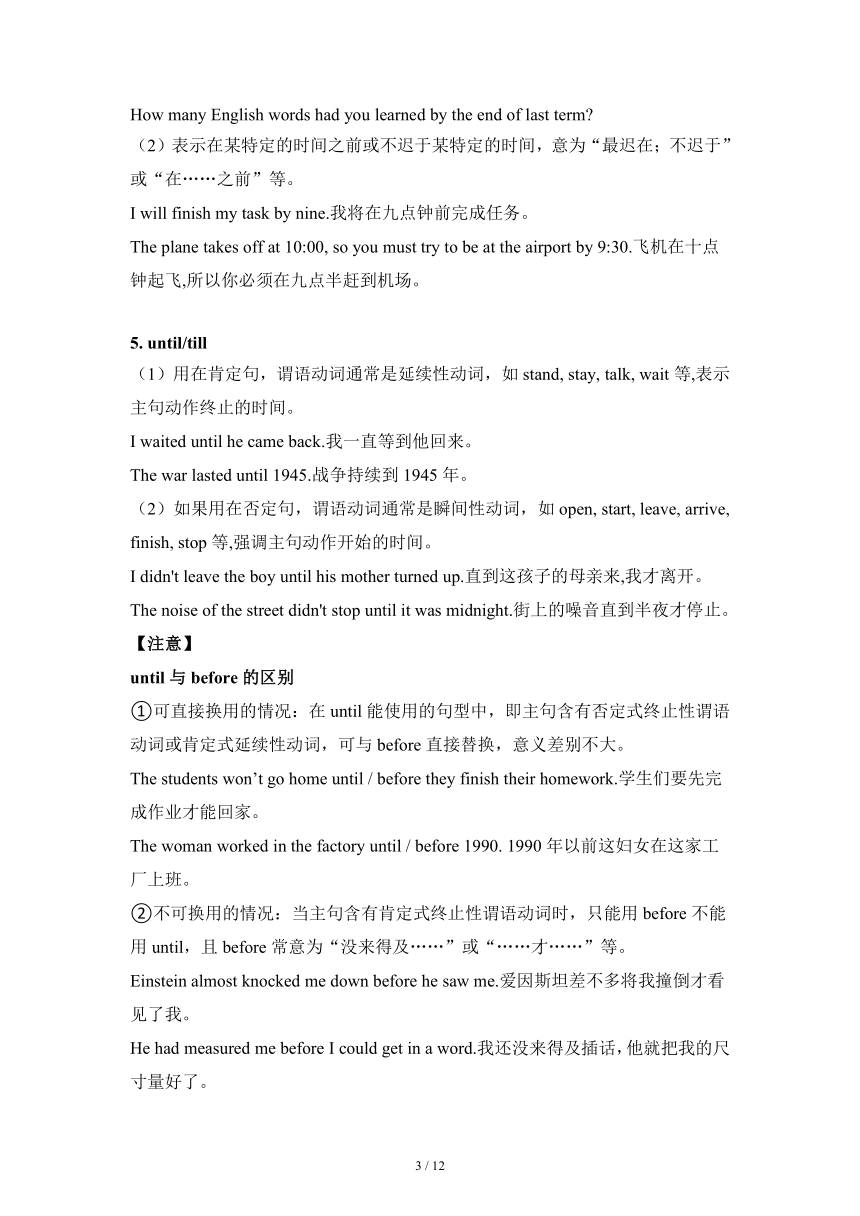
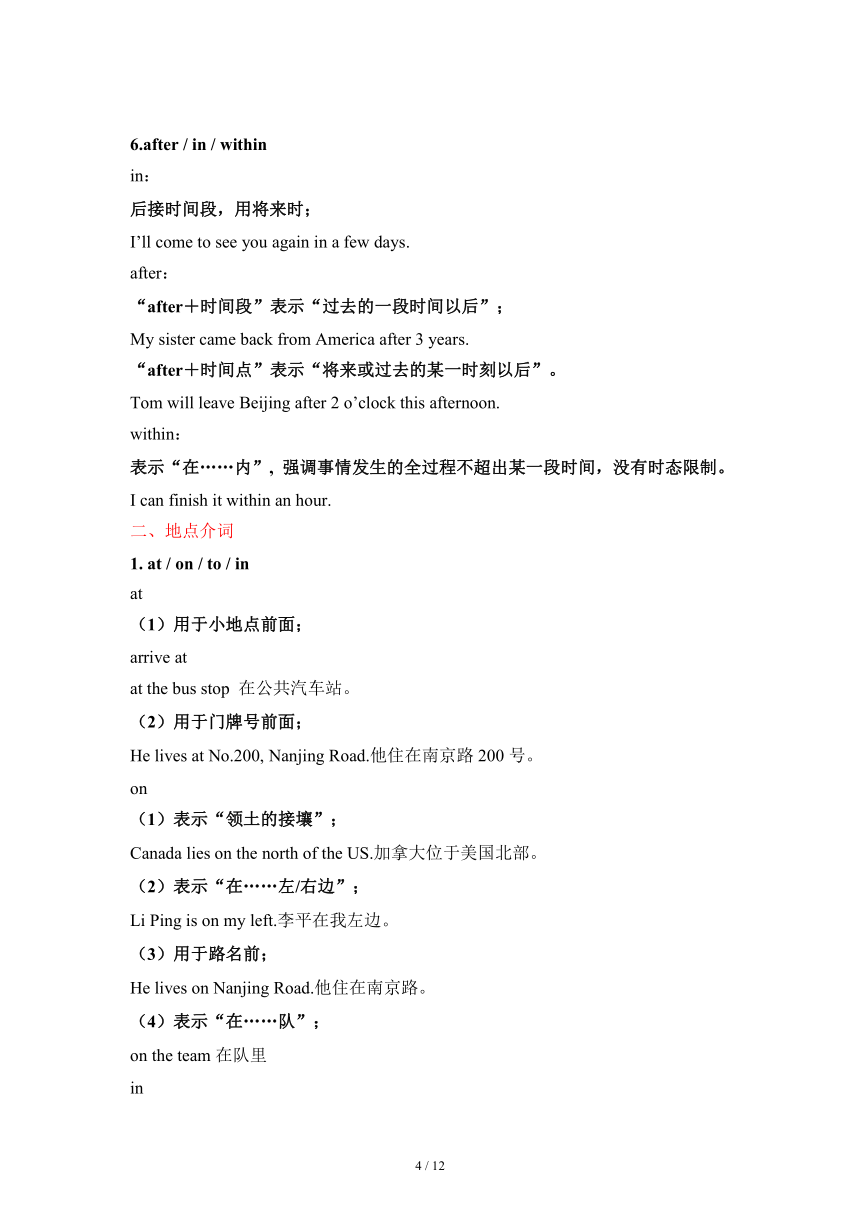
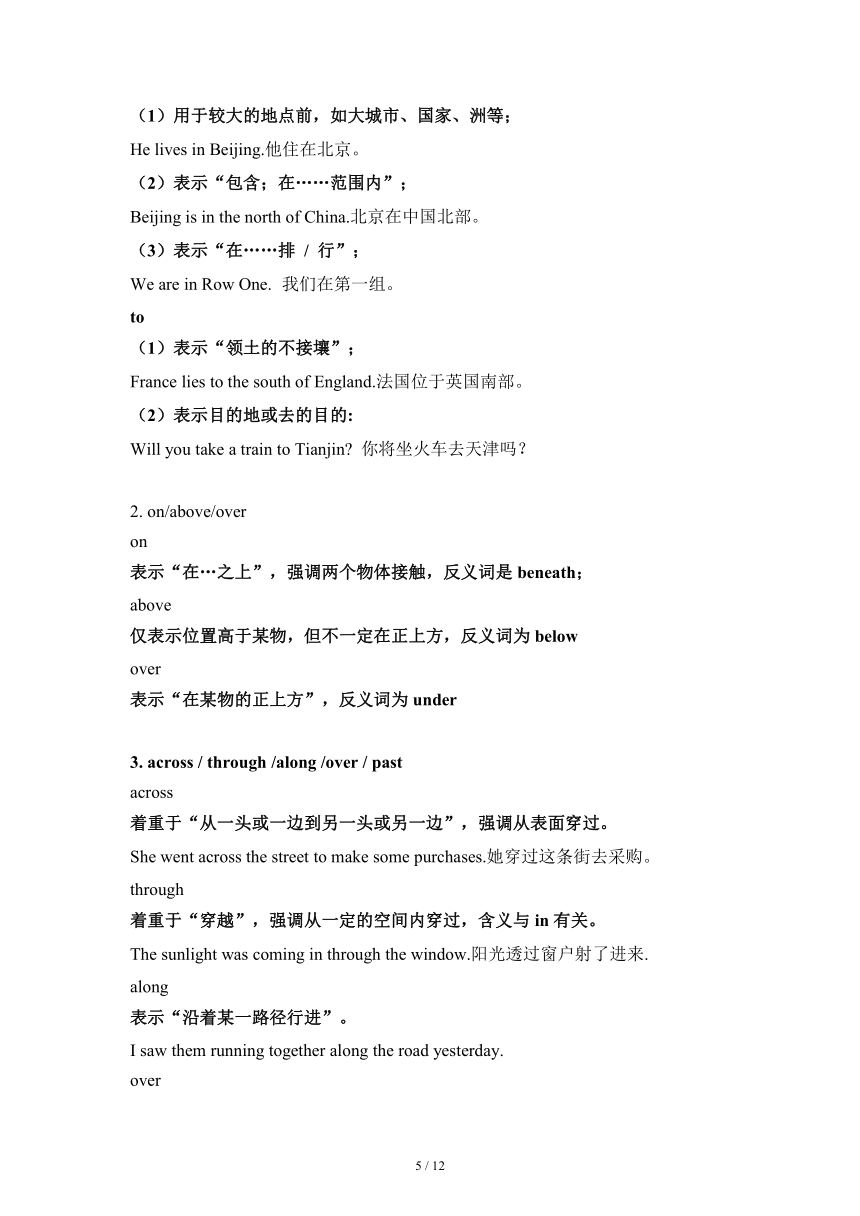
文档简介
英语学科个性化教学辅导教案
学生 年级 上课地点 第 次授课
授课时间 年 月 日 星期 学科老师 班主任
教学课题 Lesson 05 介词及介词短语
教学目标 方位介词、时间介词、表用途
教学重、难点 各介词用法梳理
教学内容
一、时间介词
1.at/on/in
at
(1)用于某一具体时刻:在五点钟at five o’clock
(2)重大西方节日之前:在圣诞节at Christmas 注意:on Christmas Eve
(3)在……多少岁的时候:在5岁的时候 at the age of 5
其他:
在中午at noon;在夜晚at night;在午夜at midnight;在黎明 at daybreak / at dawn;在黄昏at dusk
on
(1)用在具体某一天。
on National Day在国庆节;on Sunday在星期天。
(3)具体某天的上午、下午、晚上。
on a cold morning在一个寒冷的早晨
in
(1)in用在周、月、季、年等前面。
in a week;in summer;in May
(2)泛指的上午、下午、晚上。
in the afternoon;in the morning;in the evening
(3)in +段时间,表示……之后。
in 2 two days
2.for / during / through
for
表示长达……(时间),后接时间段,一般多用于完成时。
I have had this book for a long time.我买这本书好长时间了。
during
意为“在一段时间内”的行为或状态,与一段时间的整体连用,eg. during the winter, during yesterday;也可以和表示延续性事件的名词连用,during our stay, during my visit等。一般不用在现在完成时的句子里。
I made many good friends during my visit to China. 我在中国参观期间交了很多好朋友。
There’s too much wind in the north during the spring.春季北方的风很多。
through
表示“从……开始到……结束的全过程”。
It’s very hot through the whole summer this year.全年整个夏季都很热。
We work from Monday through Sunday.从周一到周日我们都在上班。
3.from/since
from
表示“时间的起点,”可译作“从……起”,多用于“from...to / till”
You can come anytime from Monday to Friday.
since
表示“自从……以来(直到现在)”“since+具体的过去时间点或‘时间段+ago’或一般过去时的句子”,常与完成时连用。
I have taught in No.12 Middle School since1989.
4.before / by
before
指“在……之前”,与after相对。
Please come before 10 o’clock.
by
(1)用来表示“在……之前,到……时”的结构为“by+时间点”,常与完成时连用。
How many English words had you learned by the end of last term
(2)表示在某特定的时间之前或不迟于某特定的时间,意为“最迟在;不迟于”或“在……之前”等。
I will finish my task by nine.我将在九点钟前完成任务。
The plane takes off at 10:00, so you must try to be at the airport by 9:30.飞机在十点钟起飞,所以你必须在九点半赶到机场。
5. until/till
(1)用在肯定句,谓语动词通常是延续性动词,如stand, stay, talk, wait等,表示主句动作终止的时间。
I waited until he came back.我一直等到他回来。
The war lasted until 1945. 战争持续到1945年。
(2)如果用在否定句,谓语动词通常是瞬间性动词,如open, start, leave, arrive, finish, stop等,强调主句动作开始的时间。
I didn't leave the boy until his mother turned up.直到这孩子的母亲来,我才离开。
The noise of the street didn't stop until it was midnight.街上的噪音直到半夜才停止。
【注意】
until与before的区别
①可直接换用的情况:在until能使用的句型中,即主句含有否定式终止性谓语动词或肯定式延续性动词,可与before直接替换,意义差别不大。
The students won’t go home until / before they finish their homework.学生们要先完成作业才能回家。
The woman worked in the factory until / before 1990. 1990年以前这妇女在这家工厂上班。
②不可换用的情况:当主句含有肯定式终止性谓语动词时,只能用before不能用until,且before常意为“没来得及……”或“……才……”等。
Einstein almost knocked me down before he saw me.爱因斯坦差不多将我撞倒才看见了我。
He had measured me before I could get in a word.我还没来得及插话,他就把我的尺寸量好了。
6.after / in / within
in:
后接时间段,用将来时;
I’ll come to see you again in a few days.
after:
“after+时间段”表示“过去的一段时间以后”;
My sister came back from America after 3 years.
“after+时间点”表示“将来或过去的某一时刻以后”。
Tom will leave Beijing after 2 o’clock this afternoon.
within:
表示“在……内”, 强调事情发生的全过程不超出某一段时间,没有时态限制。
I can finish it within an hour.
二、地点介词
1. at / on / to / in
at
(1)用于小地点前面;
arrive at
at the bus stop 在公共汽车站。
(2)用于门牌号前面;
He lives at No.200, Nanjing Road.他住在南京路200号。
on
(1)表示“领土的接壤”;
Canada lies on the north of the US.加拿大位于美国北部。
(2)表示“在……左/右边”;
Li Ping is on my left.李平在我左边。
(3)用于路名前;
He lives on Nanjing Road.他住在南京路。
(4)表示“在……队”;
on the team在队里
in
(1)用于较大的地点前,如大城市、国家、洲等;
He lives in Beijing.他住在北京。
(2)表示“包含;在……范围内”;
Beijing is in the north of China.北京在中国北部。
(3)表示“在……排 / 行”;
We are in Row One. 我们在第一组。
to
(1)表示“领土的不接壤”;
France lies to the south of England.法国位于英国南部。
(2)表示目的地或去的目的:
Will you take a train to Tianjin 你将坐火车去天津吗?
2. on/above/over
on
表示“在…之上”,强调两个物体接触,反义词是beneath;
above
仅表示位置高于某物,但不一定在正上方,反义词为below
over
表示“在某物的正上方”,反义词为under
3. across / through /along /over / past
across
着重于“从一头或一边到另一头或另一边”,强调从表面穿过。
She went across the street to make some purchases.她穿过这条街去采购。
through
着重于“穿越”,强调从一定的空间内穿过,含义与in有关。
The sunlight was coming in through the window.阳光透过窗户射了进来.
along
表示“沿着某一路径行进”。
I saw them running together along the road yesterday.
over
强调从上方越过。
I jump over the wall.
past
从前面或者后面经过。
I passed from the door.
4. between / among
between
指“两者之间”或者“两个以上的人或物中两两之间”。
My school is between the post office and the hospital.我的学校在邮局和医院之间。
among
指三者或三者以上的中间; 其中三者三者以上的两者之间也用between。
I found him among the crowd.我从人群中发现了他。
between 3 meals
5.表示“前,后”的介词
(1)in front of , in the front of, before 表示“在…之前”
in front of = before表示“在某一范围之外的前面”;in the front of表示“在某一范围之内的前部”。
Tom is short and always sits in the front of the classroom.汤姆很矮,一直坐在教室的前面。
There is a tree in front of / before my house.我的房前有棵大树。
(2)at the back of, behind, after三者均有“在…之后”之意.
at the back of是in the front of的反义词,表示“在某一范围之内的后部”;behind是in front of的反义词,表示“在某一范围之外的后面”;after可与behind互换,也可以用于表示运动的词后面。
There’s a blackboard at the back of the classroom.教室后面有块黑板。
Your cat is hiding behind the tree.你的猫躲在树后面。
The couples are walking after their son.这对夫妇跟在他们的儿子后面散步。
三、其他介词
1.表示“标准或者单位”的介词:at / for / by
at
表示“以……速度,以……价格”。
He drove at a speed of 80 mph.
I sold my car at a high price.
for
表示“用……交换”。
I bought the car for 20000 dollars.
by
表示“以……计”,后跟度量单位。
Gold is sold by the gram.
They paid him by the month.
2.表示“材料”的介词:of / from
of
表示从成品可以看出原材料;
The box is made of paper.
from
表示从成品看不出原材料;
Bread is made from wheat.
3.表示“方式、途径、方法”的介词:with, by, in, on
with
表示“用工具,”所用东西都是具体的,后面接的名词必须用冠词或者物主代词
We listen with our ears.我们用耳朵听。
Please write with a pen.
by
指“靠……手段,用……方法,凭借……”,后接名词,代词或者动名词;by + 交通工具名词,表示交通方式;
He makes a living by selling newspaper.
by bike, by train, by car
by land, by water, by sea, by air
in
表示“用某种语言、材料;用某种方式”。
What’s that in English 那个用英语怎么说?
in ink用文字
in this way用这种方法
on
表示“使用一些无线电工具”, 偶尔也用over来代替;
I often talk with my friends on the phone.我经常通过电话与朋友交谈。
注:通过卫星 (satellite) 传播用through
4.表示“关于”的介词:of / about / on
of
指“关于”人或者物存在, 有“提及”之意。
He spoke of the film the other day.
about
指“关于”某人或者某物较详细的情况。
I happened to know about him.
on
指“关于”学术性的或者严肃性的、供专门研究的。
It’s a textbook on the history of China.
5.表示“刻度、气压、深度海拔等”的介词:at, above, below。
在具体某一刻度用at, 高于某一刻度用above,低于某一刻度用below。
at the normal pressure;
The sun rose above the horizon.
6.表示“原因,理由”的介词:for, at, with, from / of
for
常与表示文明、奖罚、害怕等意义的形容词或者动词连用, 如:famous, known, praise, punish, tremble等。
Xi’an is famous for it beautiful scenery.
at
常与表示“喜怒哀乐”等的形容词或者过去分词(如happy, pleased, angry, delighted 等)连用,表示产生这种情感的原因。
He was surprised at the news.
with
常与表示“喜怒哀乐”等的抽象名词连用。强调随着心理变化而产生情感变化。
He shouted loudly with anger.
from /of
常与die 连用,用of 时通常指死于疾病、饥饿、衰老等,而from则指由于死于受伤或事故。
He died from the traffic accident.
He died of cancer.
7.表示“像……一样”的介词:like, as
like
像……一样(其实不是)
The little tiger looks like a cat.
as
作为,以……身份(其实是)
He talked to me as a father.
四、固定搭配
1.介词与动词
do well in 在某方面做的好 do with 处置 agree with sb.同意某人
begin with 以…开始 laugh at 嘲笑 help with在……方面帮助
leave for 动身去某地 catch up with赶上 get on / along with与……相处
arrive in / at到达 make friends with与……交朋友 take care of 照顾、照料
look at 看 listen to 听 hear from收到某人来信
look for 寻找 turn on / off打开/关上 send for 派人去请
look after 照看、照料 put on穿上 pay for为……付钱
look over 检查 depend on依赖、依靠 wait for 等候
fill with 充满 ask for 要,要求
2.介词和形容词的固定搭配
be satisfied with sb.对某人感到满意 be weak in在某方面差
be good / bad for对……有益/有害 be late for迟到
be pleased with sb.对某人感到满意 be busy with 忙于
be angry at sth.因……而生气 be made of由……制成
be angry with sb. 生某人的气 be good at在……方面做的好
be full of充满 be different from 与……不同
be strict with sb. 对某人要求严格 be strict in sth.对某事要求严格
be proud of以……为荣
3.介词与名词搭配
in time及时 at work 在工作 on time按时 in fact 事实上
at home 在家 at once马上 at night晚上 in trouble处于困境
on foot 步行 on duty值日 in a hurry匆忙 in the sun在阳光下
五、介词的省略
1.当表示时间的词前面有this, that, next, last, every, each, some, any, all, yesterday, today等时,介词常省略。
We watched an exciting movie yesterday afternoon.
2.表示时间的名词前有不定冠词,且不定冠词表示“每一……”解时,前面不用介词。
An apple a day keeps the doctor away.
3.习惯搭配中的介词省略
spend some time (in) doing
waste some time (in) doing
have difficulty / trouble (in) doing sth
be busy (in) doing sth
stop / prevent sb (from) doing sth
六、常用介词用法梳理
1.for
1.当做;作为:I like some bread and milk for breakfast.
2.表示理由或者原因,意思为“因为,由于”:Thank you for helping me
3.表示对象,目的等,意思为“给,对,供”:There is a letter for you.
4.表示时间,距离:I usually run for 2 hours.;We will stay here for 2 weeks.
5.表示去向:The train for Paris is leaving.
6.表示赞成,支持:Are you for the plan or against it
2.with
1.与,同,和……一致:She came with me.
2.在……身上:I don’t have money with me.
3.和……相符:A blue shirt goes with your pants.
4.随着:Air pressure varies with height.
5.具有,带有:She is a woman with a sense of humor.
6.用语with复合结构中:With the sun shining brightly, we should go for a swim.
3.off
(1)从……下来,从……脱离,离开:
I fell off my bike yesterday.;
Let’s take the picture off the wall.;
Keep off the grass.
(2)远离,在……不远处:The island is about 100 miles off the coast.
(3)不想,戒除:He is off cigarette.
(4)下班,休息:She comes off duty at 5 o’clock.
(5)脱离,偏离:Half of what he said is off the subject.
4.by
(1)用于被动语态的句子中,表示动作的执行者,意为“被;由”。
He was praised by the teacher.他受到了老师的表扬。
the book was written by Lu Xun. 这本书是鲁迅写的。
(2)表示方式、方法、手段等,后常接无冠词的名词或动名词,意为“通过;靠;用”。
Don’t judge a person by appearances.勿以貌取人。
He made a living by teaching.他以教书为生。
(3)表示时间,意为“到……时(为止)”或“不迟于……”。
He ought to be here by now.他现在应该在这儿了。
By the time he was ten, he had learnt about 1,000 English words.到十岁时,他已学了约一千个英语单词。
(4)表示(增减)程度,尺寸数量等,意为“至……的程度”。
the bullet missed me by two inches.那子弹以两英寸之差未击中我。
the rope needs to be longer by two feet.这绳子需要再长两英尺。
(5)表示交通路线或工具,后接名词不用冠词,意为“乘;坐”。
go by bus / plane / train 乘汽车(飞机、火车)去
travel by land / sea / air 陆上(海上、空中)旅行
(6)表示位置,意为“在近旁;在……旁边”。
There is a pumping station by the river.河边有个抽水站。
5.of
(1)(表示所属)(属于)……的the wall of the garden
(2)(表示材料 / 构成)由……制成的The desk is made of wood.
(3)(表示主题)关于a story of adventure
(4)表示同位the city of Shenzhen
(5)表原因die of
(6)表示适量种类a cup of coffee
6.as
(1)作为;当作:He has worked as a diplomat in the US.
(2)还是……的时候:She loved singing as a child and started vocal training at 12.
学生 年级 上课地点 第 次授课
授课时间 年 月 日 星期 学科老师 班主任
教学课题 Lesson 05 介词及介词短语
教学目标 方位介词、时间介词、表用途
教学重、难点 各介词用法梳理
教学内容
一、时间介词
1.at/on/in
at
(1)用于某一具体时刻:在五点钟at five o’clock
(2)重大西方节日之前:在圣诞节at Christmas 注意:on Christmas Eve
(3)在……多少岁的时候:在5岁的时候 at the age of 5
其他:
在中午at noon;在夜晚at night;在午夜at midnight;在黎明 at daybreak / at dawn;在黄昏at dusk
on
(1)用在具体某一天。
on National Day在国庆节;on Sunday在星期天。
(3)具体某天的上午、下午、晚上。
on a cold morning在一个寒冷的早晨
in
(1)in用在周、月、季、年等前面。
in a week;in summer;in May
(2)泛指的上午、下午、晚上。
in the afternoon;in the morning;in the evening
(3)in +段时间,表示……之后。
in 2 two days
2.for / during / through
for
表示长达……(时间),后接时间段,一般多用于完成时。
I have had this book for a long time.我买这本书好长时间了。
during
意为“在一段时间内”的行为或状态,与一段时间的整体连用,eg. during the winter, during yesterday;也可以和表示延续性事件的名词连用,during our stay, during my visit等。一般不用在现在完成时的句子里。
I made many good friends during my visit to China. 我在中国参观期间交了很多好朋友。
There’s too much wind in the north during the spring.春季北方的风很多。
through
表示“从……开始到……结束的全过程”。
It’s very hot through the whole summer this year.全年整个夏季都很热。
We work from Monday through Sunday.从周一到周日我们都在上班。
3.from/since
from
表示“时间的起点,”可译作“从……起”,多用于“from...to / till”
You can come anytime from Monday to Friday.
since
表示“自从……以来(直到现在)”“since+具体的过去时间点或‘时间段+ago’或一般过去时的句子”,常与完成时连用。
I have taught in No.12 Middle School since1989.
4.before / by
before
指“在……之前”,与after相对。
Please come before 10 o’clock.
by
(1)用来表示“在……之前,到……时”的结构为“by+时间点”,常与完成时连用。
How many English words had you learned by the end of last term
(2)表示在某特定的时间之前或不迟于某特定的时间,意为“最迟在;不迟于”或“在……之前”等。
I will finish my task by nine.我将在九点钟前完成任务。
The plane takes off at 10:00, so you must try to be at the airport by 9:30.飞机在十点钟起飞,所以你必须在九点半赶到机场。
5. until/till
(1)用在肯定句,谓语动词通常是延续性动词,如stand, stay, talk, wait等,表示主句动作终止的时间。
I waited until he came back.我一直等到他回来。
The war lasted until 1945. 战争持续到1945年。
(2)如果用在否定句,谓语动词通常是瞬间性动词,如open, start, leave, arrive, finish, stop等,强调主句动作开始的时间。
I didn't leave the boy until his mother turned up.直到这孩子的母亲来,我才离开。
The noise of the street didn't stop until it was midnight.街上的噪音直到半夜才停止。
【注意】
until与before的区别
①可直接换用的情况:在until能使用的句型中,即主句含有否定式终止性谓语动词或肯定式延续性动词,可与before直接替换,意义差别不大。
The students won’t go home until / before they finish their homework.学生们要先完成作业才能回家。
The woman worked in the factory until / before 1990. 1990年以前这妇女在这家工厂上班。
②不可换用的情况:当主句含有肯定式终止性谓语动词时,只能用before不能用until,且before常意为“没来得及……”或“……才……”等。
Einstein almost knocked me down before he saw me.爱因斯坦差不多将我撞倒才看见了我。
He had measured me before I could get in a word.我还没来得及插话,他就把我的尺寸量好了。
6.after / in / within
in:
后接时间段,用将来时;
I’ll come to see you again in a few days.
after:
“after+时间段”表示“过去的一段时间以后”;
My sister came back from America after 3 years.
“after+时间点”表示“将来或过去的某一时刻以后”。
Tom will leave Beijing after 2 o’clock this afternoon.
within:
表示“在……内”, 强调事情发生的全过程不超出某一段时间,没有时态限制。
I can finish it within an hour.
二、地点介词
1. at / on / to / in
at
(1)用于小地点前面;
arrive at
at the bus stop 在公共汽车站。
(2)用于门牌号前面;
He lives at No.200, Nanjing Road.他住在南京路200号。
on
(1)表示“领土的接壤”;
Canada lies on the north of the US.加拿大位于美国北部。
(2)表示“在……左/右边”;
Li Ping is on my left.李平在我左边。
(3)用于路名前;
He lives on Nanjing Road.他住在南京路。
(4)表示“在……队”;
on the team在队里
in
(1)用于较大的地点前,如大城市、国家、洲等;
He lives in Beijing.他住在北京。
(2)表示“包含;在……范围内”;
Beijing is in the north of China.北京在中国北部。
(3)表示“在……排 / 行”;
We are in Row One. 我们在第一组。
to
(1)表示“领土的不接壤”;
France lies to the south of England.法国位于英国南部。
(2)表示目的地或去的目的:
Will you take a train to Tianjin 你将坐火车去天津吗?
2. on/above/over
on
表示“在…之上”,强调两个物体接触,反义词是beneath;
above
仅表示位置高于某物,但不一定在正上方,反义词为below
over
表示“在某物的正上方”,反义词为under
3. across / through /along /over / past
across
着重于“从一头或一边到另一头或另一边”,强调从表面穿过。
She went across the street to make some purchases.她穿过这条街去采购。
through
着重于“穿越”,强调从一定的空间内穿过,含义与in有关。
The sunlight was coming in through the window.阳光透过窗户射了进来.
along
表示“沿着某一路径行进”。
I saw them running together along the road yesterday.
over
强调从上方越过。
I jump over the wall.
past
从前面或者后面经过。
I passed from the door.
4. between / among
between
指“两者之间”或者“两个以上的人或物中两两之间”。
My school is between the post office and the hospital.我的学校在邮局和医院之间。
among
指三者或三者以上的中间; 其中三者三者以上的两者之间也用between。
I found him among the crowd.我从人群中发现了他。
between 3 meals
5.表示“前,后”的介词
(1)in front of , in the front of, before 表示“在…之前”
in front of = before表示“在某一范围之外的前面”;in the front of表示“在某一范围之内的前部”。
Tom is short and always sits in the front of the classroom.汤姆很矮,一直坐在教室的前面。
There is a tree in front of / before my house.我的房前有棵大树。
(2)at the back of, behind, after三者均有“在…之后”之意.
at the back of是in the front of的反义词,表示“在某一范围之内的后部”;behind是in front of的反义词,表示“在某一范围之外的后面”;after可与behind互换,也可以用于表示运动的词后面。
There’s a blackboard at the back of the classroom.教室后面有块黑板。
Your cat is hiding behind the tree.你的猫躲在树后面。
The couples are walking after their son.这对夫妇跟在他们的儿子后面散步。
三、其他介词
1.表示“标准或者单位”的介词:at / for / by
at
表示“以……速度,以……价格”。
He drove at a speed of 80 mph.
I sold my car at a high price.
for
表示“用……交换”。
I bought the car for 20000 dollars.
by
表示“以……计”,后跟度量单位。
Gold is sold by the gram.
They paid him by the month.
2.表示“材料”的介词:of / from
of
表示从成品可以看出原材料;
The box is made of paper.
from
表示从成品看不出原材料;
Bread is made from wheat.
3.表示“方式、途径、方法”的介词:with, by, in, on
with
表示“用工具,”所用东西都是具体的,后面接的名词必须用冠词或者物主代词
We listen with our ears.我们用耳朵听。
Please write with a pen.
by
指“靠……手段,用……方法,凭借……”,后接名词,代词或者动名词;by + 交通工具名词,表示交通方式;
He makes a living by selling newspaper.
by bike, by train, by car
by land, by water, by sea, by air
in
表示“用某种语言、材料;用某种方式”。
What’s that in English 那个用英语怎么说?
in ink用文字
in this way用这种方法
on
表示“使用一些无线电工具”, 偶尔也用over来代替;
I often talk with my friends on the phone.我经常通过电话与朋友交谈。
注:通过卫星 (satellite) 传播用through
4.表示“关于”的介词:of / about / on
of
指“关于”人或者物存在, 有“提及”之意。
He spoke of the film the other day.
about
指“关于”某人或者某物较详细的情况。
I happened to know about him.
on
指“关于”学术性的或者严肃性的、供专门研究的。
It’s a textbook on the history of China.
5.表示“刻度、气压、深度海拔等”的介词:at, above, below。
在具体某一刻度用at, 高于某一刻度用above,低于某一刻度用below。
at the normal pressure;
The sun rose above the horizon.
6.表示“原因,理由”的介词:for, at, with, from / of
for
常与表示文明、奖罚、害怕等意义的形容词或者动词连用, 如:famous, known, praise, punish, tremble等。
Xi’an is famous for it beautiful scenery.
at
常与表示“喜怒哀乐”等的形容词或者过去分词(如happy, pleased, angry, delighted 等)连用,表示产生这种情感的原因。
He was surprised at the news.
with
常与表示“喜怒哀乐”等的抽象名词连用。强调随着心理变化而产生情感变化。
He shouted loudly with anger.
from /of
常与die 连用,用of 时通常指死于疾病、饥饿、衰老等,而from则指由于死于受伤或事故。
He died from the traffic accident.
He died of cancer.
7.表示“像……一样”的介词:like, as
like
像……一样(其实不是)
The little tiger looks like a cat.
as
作为,以……身份(其实是)
He talked to me as a father.
四、固定搭配
1.介词与动词
do well in 在某方面做的好 do with 处置 agree with sb.同意某人
begin with 以…开始 laugh at 嘲笑 help with在……方面帮助
leave for 动身去某地 catch up with赶上 get on / along with与……相处
arrive in / at到达 make friends with与……交朋友 take care of 照顾、照料
look at 看 listen to 听 hear from收到某人来信
look for 寻找 turn on / off打开/关上 send for 派人去请
look after 照看、照料 put on穿上 pay for为……付钱
look over 检查 depend on依赖、依靠 wait for 等候
fill with 充满 ask for 要,要求
2.介词和形容词的固定搭配
be satisfied with sb.对某人感到满意 be weak in在某方面差
be good / bad for对……有益/有害 be late for迟到
be pleased with sb.对某人感到满意 be busy with 忙于
be angry at sth.因……而生气 be made of由……制成
be angry with sb. 生某人的气 be good at在……方面做的好
be full of充满 be different from 与……不同
be strict with sb. 对某人要求严格 be strict in sth.对某事要求严格
be proud of以……为荣
3.介词与名词搭配
in time及时 at work 在工作 on time按时 in fact 事实上
at home 在家 at once马上 at night晚上 in trouble处于困境
on foot 步行 on duty值日 in a hurry匆忙 in the sun在阳光下
五、介词的省略
1.当表示时间的词前面有this, that, next, last, every, each, some, any, all, yesterday, today等时,介词常省略。
We watched an exciting movie yesterday afternoon.
2.表示时间的名词前有不定冠词,且不定冠词表示“每一……”解时,前面不用介词。
An apple a day keeps the doctor away.
3.习惯搭配中的介词省略
spend some time (in) doing
waste some time (in) doing
have difficulty / trouble (in) doing sth
be busy (in) doing sth
stop / prevent sb (from) doing sth
六、常用介词用法梳理
1.for
1.当做;作为:I like some bread and milk for breakfast.
2.表示理由或者原因,意思为“因为,由于”:Thank you for helping me
3.表示对象,目的等,意思为“给,对,供”:There is a letter for you.
4.表示时间,距离:I usually run for 2 hours.;We will stay here for 2 weeks.
5.表示去向:The train for Paris is leaving.
6.表示赞成,支持:Are you for the plan or against it
2.with
1.与,同,和……一致:She came with me.
2.在……身上:I don’t have money with me.
3.和……相符:A blue shirt goes with your pants.
4.随着:Air pressure varies with height.
5.具有,带有:She is a woman with a sense of humor.
6.用语with复合结构中:With the sun shining brightly, we should go for a swim.
3.off
(1)从……下来,从……脱离,离开:
I fell off my bike yesterday.;
Let’s take the picture off the wall.;
Keep off the grass.
(2)远离,在……不远处:The island is about 100 miles off the coast.
(3)不想,戒除:He is off cigarette.
(4)下班,休息:She comes off duty at 5 o’clock.
(5)脱离,偏离:Half of what he said is off the subject.
4.by
(1)用于被动语态的句子中,表示动作的执行者,意为“被;由”。
He was praised by the teacher.他受到了老师的表扬。
the book was written by Lu Xun. 这本书是鲁迅写的。
(2)表示方式、方法、手段等,后常接无冠词的名词或动名词,意为“通过;靠;用”。
Don’t judge a person by appearances.勿以貌取人。
He made a living by teaching.他以教书为生。
(3)表示时间,意为“到……时(为止)”或“不迟于……”。
He ought to be here by now.他现在应该在这儿了。
By the time he was ten, he had learnt about 1,000 English words.到十岁时,他已学了约一千个英语单词。
(4)表示(增减)程度,尺寸数量等,意为“至……的程度”。
the bullet missed me by two inches.那子弹以两英寸之差未击中我。
the rope needs to be longer by two feet.这绳子需要再长两英尺。
(5)表示交通路线或工具,后接名词不用冠词,意为“乘;坐”。
go by bus / plane / train 乘汽车(飞机、火车)去
travel by land / sea / air 陆上(海上、空中)旅行
(6)表示位置,意为“在近旁;在……旁边”。
There is a pumping station by the river.河边有个抽水站。
5.of
(1)(表示所属)(属于)……的the wall of the garden
(2)(表示材料 / 构成)由……制成的The desk is made of wood.
(3)(表示主题)关于a story of adventure
(4)表示同位the city of Shenzhen
(5)表原因die of
(6)表示适量种类a cup of coffee
6.as
(1)作为;当作:He has worked as a diplomat in the US.
(2)还是……的时候:She loved singing as a child and started vocal training at 12.
同课章节目录
- 词法
- 名词
- 动词和动词短语
- 动词语态
- 动词时态
- 助动词和情态动词
- 非谓语动词
- 冠词
- 代词
- 数词和量词
- 形容词副词及其比较等级
- 介词和介词短语
- 连词和感叹词
- 构词法
- 相似、相近词比较
- 句法
- 陈述句
- 一般疑问句和否定疑问句
- 特殊疑问句及选择疑问句
- 反意疑问句
- 存在句(There be句型)
- 宾语从句
- 定语从句
- 状语从句
- 主谓一致问题
- 简单句
- 并列句
- 复合句
- 主谓一致
- 主、表语从句
- 名词性从句
- 直接引语和间接引语
- 虚拟语气
- 感叹句
- 强调句
- 倒装句
- 祈使句
- 句子的成分
- 句子的分类
- 题型专区
- 单项选择部分
- 易错题
- 完形填空
- 阅读理解
- 词汇练习
- 听说训练
- 句型转换
- 补全对话
- 短文改错
- 翻译
- 书面表达
- 任务型阅读
- 语法填空
- 其他资料
